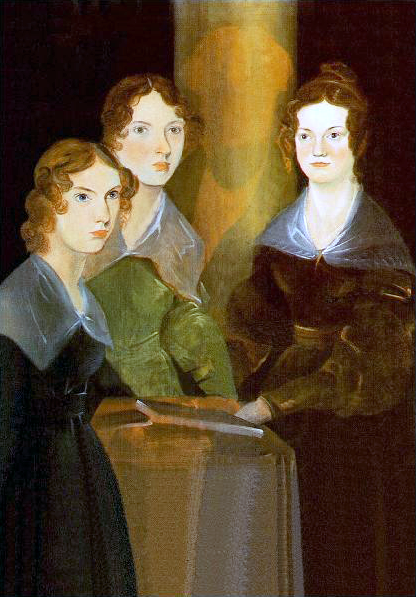.
Erinnerungen an das Riesengebirge (The Giant Mountains): Caspar David Friedrich, c. 1835 (The Hermitage)
The night is darkening round me
The wild winds coldly blow
But a tyrant spell has bound me
And I cannot cannot go
The giant trees are bending
Their bare boughs weighed with snow
And the storm is fast descending
And yet I cannot go
Clouds beyond clouds above me
Wastes beyond wastes below
But nothing dear can move me
I will not cannot go
The Brontë sisters: left to right, Anne, Emily and Charlotte (in center, the shadow of the portraitist, who has painted himself out of the picture): Branwell Brontë, 1834
Emily Brontë: Branwell Brontë, n.d.
Emily Jane Brontë (1818-1848): "The night is darkening round me", November 1837






9 comments:
This and the next poem are so touching! (and depressing in some ways)
I hope sunny California will be sunny again soon. Though, melancholy is always more touching and contagious than happiness, at least for me.
I think it's known as "the English disease".
Perhaps this will help.
(The "ripple effect"?)
Your pairing and presentation of Bronte's poem and the Friedrich are really exquisite. Briefly researching "the English disease" was fascinating also. Many more corridors than I would have expected.
Curtis, I was struck by the fact Friedrich's painting was produced only a bit more than a year after Brontë's poem.
Of course CDF's Giant Mountains are a few miles (and a few dimensions) away from the West Riding of Yorkshire.
But when you throw in the bleak living conditions in the Brontë household, so conducive to pulmonary and other troubles, and the seasonal affective disorder factor, West Midlands, wind blowing, snow already falling, another hard winter coming on...
Who can blame the poor girl, for feeling a bit low.
(Sometimes one simply cannot go.)
But - speaking as one familiar with these moors, Haworth and indeed, the Brontes, from early childhood, I truly feel that Emily is not depressed but is speaking passionately.
Although the night is darkening around her and the wild winds blow, she is possessed - as always - by the 'magic' of the moors. It grips her spirit, and though she will be in some discomfort should she remain out there, she cannot - will not - leave.
Something I wholly empathise with. The wild beauty of some of the Northern (and Irish) landscape often moves me thus.
I've just discovered your blog and am quite delighted at what I find - thank you - I will enjoy reading through!
Thank you very much, Scarlotta, you've put this much better than I could have.
Some of that wildness must have been a native strain in Emily's spirit, as well.
The meter of this poem is so powerful ... the repetition of
"And I cannot cannot go"
so gripping in so few words. Again the repetition of the last line, with the variance of will
"I will not cannot go"
Very fine.
Thanks very much Don, my friends are teaching me about this one as we go.
Yes, that repetition, the intensity of the iterative expression, must lie at the heart of things here.
This poem has appeared in a few anthologies over the years, with that "conventionalized" punctuation which reduces all poetry to the one-shape-suits-all level of a copy-editor's style manual.
I found that the wild urgency -- that iterative heartbeat of the "cannot"/ "will not" -- comes to the fore much better in the original draft version, which I've reproduced here.
(I've always found the habit of "modernizing" punctuation to be implicitly patronizing, an unconscious admission on the part of the present that it assumes its narrow little way is the only way, and that the past is/was somehow benighted... whereas in truth, it's just as likely to be tother way round.)
Post a Comment